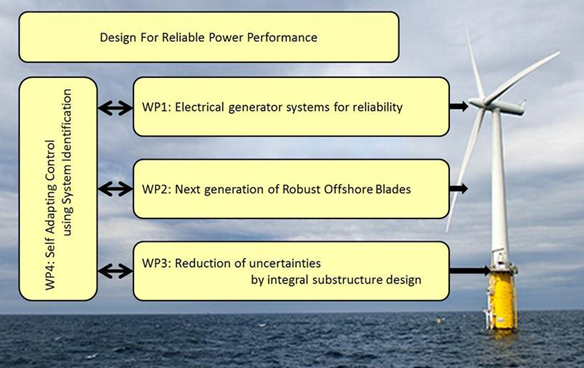Approach
The activities in the project aim to significantly reduce the uncertainty of offshore wind turbines. The uncertainty reduction is approached from three different fields of research and builds upon the R&D that has been performed in the last ten to twenty years, mainly by the European R&D institutes. The European R&D institutes have aligned large parts of their research through the European Academy of Wind Energy (EAWE) and the European Energy Research Alliance. ECN and TUDelft are prominent members of these organisations. The fundamental and long-term R&D activities, as part of four work packages, are the next step towards significant cost reductions in the offshore wind farms.

To realize the goals of the project fundamental and industrial research will be carried out by Delft University of Technology, ECN and Siemens. The industrial partners Ballast-Nedam, IHC Hydrohammer and Van Oord participate as members of an advisory board that has the purpose to provide relevant feedback and ensure that the results are of practical relevance.
The project is coordinated by ECN.
Work Packages
WP1: Electrical generator systems for reliability:
Aim: improving the availability of electrical generator systems by using modular conversion system concepts that are fault tolerant, re-configurable and self-healing.
WP2: Next Generation of Robust Offshore Blades:
Aim: generating the knowledge and design capability that enables the development of the next generation of larger and lighter offshore wind turbine blades that do not rely on failure prone features and thereby lower the cost of energy.
WP3: Reduction of uncertainties by integral substructure design:
Aim: realizing cost reduction in the support structure of offshore wind turbines while keeping a sound, safe and reliable design by using integral probabilistic structural design techniques; developing self-adaptive control algorithms dealing with constantly changing environmental conditions (e.g. water depth changes due to tides and/or scour, ice formation, etc.).
WP4: System Identification for Robust Control:
Aim: substituting unplanned with planned maintenance by bridging the gap between existing condition monitoring and fault tolerant control schemes.